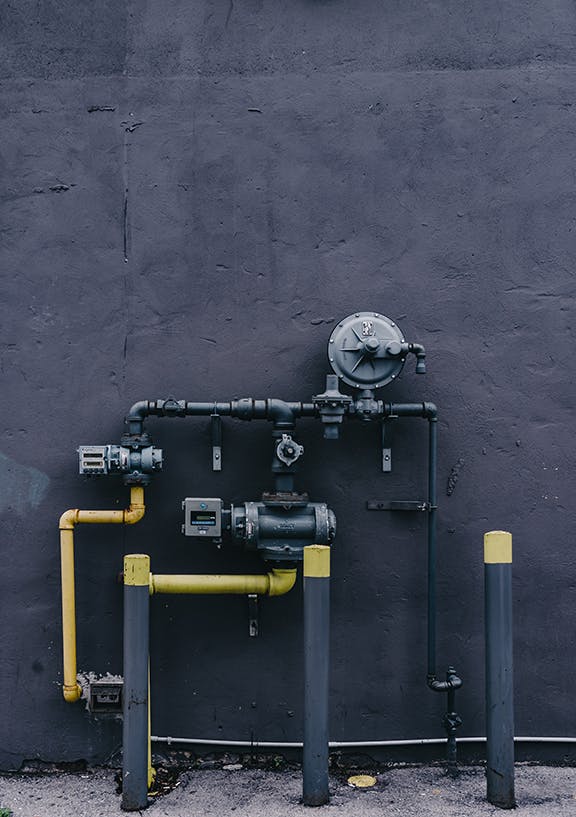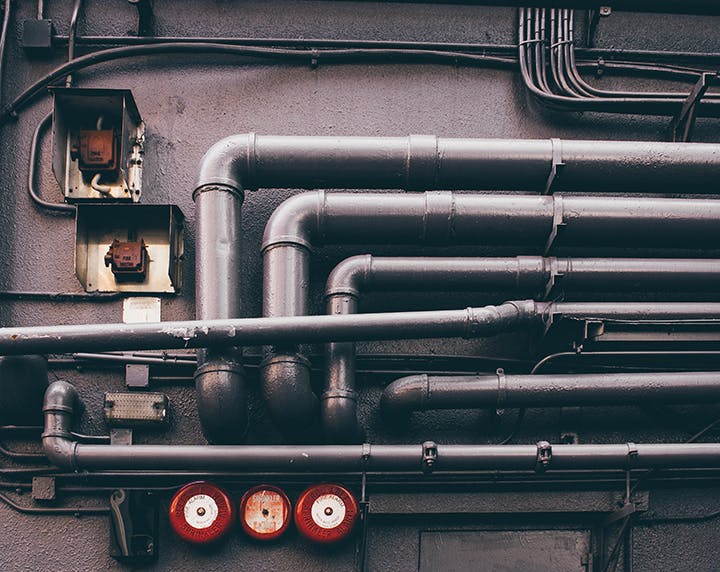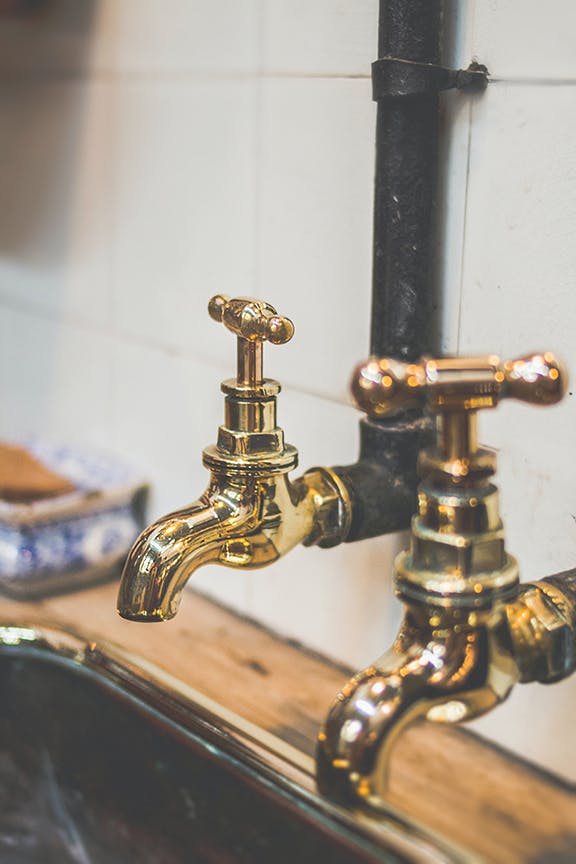
Short Answer to “at What Temperature do Pipes Freeze.”
Pipes will usually freeze when the temperature is 20 degrees faranheit outside of the building that contains the pipes. For further tips and information about how to prevent pipes from freezing and bursting, read on.
You walk into your basement and hear a steady gushing of water as you walk down the stairs. You’re worried and a little confused at the sound. But, maybe it’s just the washing machine upstairs making noises. You don’t stop to consider the fact that your home is flooded with water. When you get to the bottom step, you see an inch of water coating the ground.
You stare at the water for an impossibly long moment before you run back upstairs, throw on some rain boots and pound back down the stairs into the water. Your feet slosh in the water as you look for where the leak is coming from. You find the exposed pipes leading to the water heater. The pipe is pouring water out onto the floor. When you try to stop the flow of water with your hands, you’re sprayed in the face. So, what do you do now?
Causes of a Burst Pipe
For a pipe to burst, there are five possible contributors that could lead to a leak. These factors lead to either a gradual weakening of the pipe that leads to a small leak or a build up of pressure that causes it to burst. Both situations are dangerous. One can cause severe property damage, and the other can encourage mold growth and soak into wood and flooring. While a burst pipe will be an immediate threat, a small trickle of water can cause severe damage over time, since it’s likely that you won’t notice the leak until the damage has already been done. Here are five reasons for a burst or leaking pipe.

1. Freezing Pipes
During cold weather in the winter, pipes are exposed to the cold. When water freezes, it expands. The cold water crystallizes into ice, and the ice expands in the pipes. Pipes freeze when the water flow is too slow during extreme cold weather. Now, the main question when it comes to freezing pipes is: at what temperature do pipes freeze? Pipes freeze when water freezes because it isn’t the actual pipe that is freezing; it’s the water. Year after year, as the water freezes and thaws, the cracks in the pipes grow larger until it becomes a leak.
2. High Water Pressure
High water pressure is likely to lead to the bursting of a pipe. Water causes erosion similar to how a river bank slowly erodes over the course of decades. Over time, the river cuts deeper and deeper into the side of the bank, especially when there is a curve in the river. When the river curves, the water forcibly beats against the turn and carries away rocks and debris. A similar thing happens with high water pressure in pipes.
Over time, the force of the water erodes the metal in the pipes, causing weak points to appear. Often, the weakest places are turns in the pipage. When a bibe bursts from high water pressure, the pipe nearly explodes with water. The only way to stop it is by accessing the main shutoff valve and turning the water off. You won’t be able to use water until the pipe is fixed.
3. Foundation Shifts
The second common reason for a busted pipe is a shift in the foundation. It’s unfortunate when a home is built on a shaky foundation, since a homeowner can’t prevent the earth from moving beneath the house. If the foundation of the house shifts, the pipes could bend and form cracks. Earthquakes are often a major cause of a foundation shifting. If you live in an area prone to earthquakes, it would be a good idea to check up on the pipes regularly, so you don’t have to worry about pipe relining.

4. Corrosion and Age
Another factor that plays a role in pipe leaks is corrosion. Pipes are made of metal, and over time, metal corrodes. This mainly happens with older pipes in older buildings. Older plumbing pipes will have less building insulation, making the pipes more exposed. These exposed pipes are usually located in crawl spaces in older buildings. In the crawl spaces of a house, the pipes are left untouched and uncleaned for years. This type of damage builds on the general wear and tear of the pipes.
5. Tree Roots
When pipes are installed underground, they are safer from the elements, and they are out of the way for general construction. However, although the pipes are kept warm by the earth, they also face danger under the soil from tree roots. Trees and tree roots have the strength to push through cement sidewalks or grow through fences. Tree roots are able to mold themselves around things that are in their way. Tree roots won’t bother to change their course to avoid piping in the ground. The root can grow around the pipe and crush the metal or move the inflexible metal aside. This can cause major ground damage to the pipes and property damage to your land.

When Are Pipes in Danger of Freezing?
Water freezes at 32 degrees Fahrenheit. When water freezes, it expands, which is why cracks slowly form year after year in concrete sidewalks and asphalt roads. In the winter time, water seeps into microscopic gaps in the material. When the water freezes, the molecules expand just slightly. This forces the material apart, creating a crack. Every time the water is able to freeze and unfreeze, the cracks grow larger and larger until the roads and sidewalks are full of cracks and potholes.
A similar thing happens with pipes. When water is left in the pipes, the water is able to freeze and expand. This won’t necessarily cause a leak right away. However, if the pipes are already old and weak, it may cause a pipe burst. Typically, cracks from frozen pipes will happen over a period of time (usually over one winter if the pipes are constantly exposed to the freezing and melting of water).
However, just because the temperature outside is 32 degrees, doesn’t mean that your pipes are in danger of freezing. Most housing pipes are located inside the insulation of the walls. The insulation is meant to keep the pipes warmer than the outside temperature. You should begin to worry about your pipes freezing if:
- You are leaving the house for more than four days. If you are planning on leaving the home for an extended period of time, your pipes could be at risk. In this case, the temperature in the home would slowly drop to match the outside temperature as heat from inside slowly leaks outside. If the inside of the home is less than 50 degrees, the pipes could be in danger of freezing. If you need to leave a home in the winter (such as a winter cabin), set the thermostat in the home to 60 degrees.
- The pipes are exposed to the cold. If you have an unfinished basement with exposed pipes, the exposed pipes are in danger of freezing. Basements and garages are prone to freezing since they aren’t really a part of the home. They are typically exposed to cold temperatures since the heating systems won’t warm those areas.
- The outside temperature is lower than 20 degrees. If the outside temperature drops below 20 degrees, there’s a chance that your pipes could be at risk. Although the insulation of the home will keep the pipes reasonably warm, the walls are still able to absorb the cold air and expose the pipes to freezing temperatures.
How to Respond to a Burst Pipe
When a pipe bursts, the first thing you should do is find the shut off valves for the water. As soon as you find the valves, turn off the water to ensure that the water damage isn’t going to get worse. The shutoff valve will control the water in the entire house, meaning that you won’t be able to use water until the problem is fixed. If the pipe damage is severe, you might want to plan to stay at a hotel for a few days while the water pipes are reinstalled. If the damage is slight, the plumber might be able to fix the pipe quickly.
After shutting off the water, move immediately to shut off all electricity in the home. Obviously, electricity and water create a deadly combination. If your home has flooded, there is a risk that appliances have come in contact with the water, increasing the possibility that the water is fatal. While shutting off the electricity, avoid the water. If you have to enter the water to shut off the power, wear knee-high rubber boots to protect yourself from electrocution.
Even after you’ve shut off the electricity, you should still stay clear of puddled water. Water that has been in contact with appliances may contain dangerous materials. Appliances to watch out for when your home is flooded include appliances such as the propane heater, space heater, and plugged-in electronics. Your safety is important, and flooding in the home can be dangerous.

Once you have turned off the valve, assess the situation. Try to figure out what may have caused the pipe to burst. Was there not enough pipe insulation in the exterior walls during the winter? Was the insulation faulty? Are the water supply pipes old? Ask yourself questions that will help you determine why the pipes burst when they did and where they did. If the pipes burst in the walls, what could have caused that? Knowing what happened will help the plumber fix the problem and ensure that you get a better rate on your insurance claim.
Call the plumber and give them all of the information that you have. Tell them where the pipes burst. Give the plumber as much information as possible to ensure that the plumber will know what to fix and how to prevent the pipe from bursting again. If there was a recent earthquake that caused the leak, the plumber should know to check the rest of the pipes to ensure that there are no other weak points in the pipes.
After you’ve contacted the plumber for help with the cleanup, take a video of the home. After you’ve videod the scene, take as many pictures as you can from a variety of angles. Show which pipe burst, how much water was released, and what was damaged.

Will Insurance Cover a Bursting Pipe?
Your insurance policy with your insurance company will cover a bursting pipe. The homeowner’s policy encourages homeowners to have insurance that will cover restoration services in residential buildings. Homeowners insurance will cover flooding from a burst pipe. However, if there is flooding in the home due to storms, you will need flooding insurance (which is separate from homeowner’s insurance). Homeowners insurance will not cover flooding from storms, rains, or overflowing rivers.
Water damage is one of the most common reasons for a home insurance claim. Through a homeowner’s lifetime, it is extremely likely that they will need to file a claim to repair damages from flooding, a burst pipe, or other water related damages. Most home insurance policies will also cover damage by an outside pipe bursting. However, in order to verify whether the damage was the cause of poor maintenance or a burst pipe, the insurance company will need to send a team to investigate the situation. If the water damage was the cause of poor drainage or poor maintenance, the insurance company won’t be able to help.
To reiterate, if the water damage was directly caused by a burst pipe, either inside or outside, your insurance company should cover the costs. However, it’s important to frame the situation carefully when speaking with your insurance agent. First, don’t use the word “flood.” Insurance companies have specific definitions for “flooding,” and most definitions won’t be covered under your home insurance. Instead of telling your insurance agent that your house is “flooded,” say “there is water leaking from a burst pipe which may cause severe water damage.”

How to Prevent a Pipe Burst
Preventing a pipe burst is important. It’s easier to prevent a pipe burst than deal with a broken pipe. Burst pipe repair can be expensive and time-consuming. Busted pipes can also cost more than your homeowner’s insurance will cost. And although homeowner’s insurance covers busted pipes most of the time, you can never know how much damage a broken pipe will cause. At the very least, have the insurance to cover the cost to repair or replace the pipes.
Preventing Frozen Pipes
If you live in Alaska, North Dakota, Maine, Illinois, or another state infamous for their cold winters, you will want to prepare your pipes to prevent pipes from freezing and know how to thaw frozen pipes without doing damage.
Often to thaw frozen pipes, you will need to expose the pipes to warmer air and room temperature water (not hot water or boiling water) to slowly thaw the pipes. The slow heating of the pipes and gradual exposure to warm air will do the least amount of damage. If your pipes are exposed in the garage, ensure that you keep the doors closed (including the garage door) so that no cold air will get through the doors. You want to keep the heat in the garage. You can also use heat tape to keep pipes from freezing or to thaw them. If your pipes are in the attic or below the house, ensure that the air never drops below freezing in those spaces. You can use a freeze detector that can help you to better manage the temperature in cold areas.
Another tip to prevent pipes from freezing is to leave the faucet dripping. This ensures that there is a constant flow of cold water through the pipes. As long as there is water flow and not standing water sitting in the area, the water won’t freeze.
Other ways to prevent pipes from freezing include:
- Close the cabinet doors. This allows warm air to circulate around the pipes and keep the pipes at room temperature.
- Seal cracks in the house. Pipes will freeze because the air is cold enough to freeze the water. Sealing the cracks in the house will help seal warm air inside and will not only help to keep your pipes warm but help you save a little on your heating bill.
- Winterize your home. You can winterize your home by disconnecting hoses and draining the water from pipes.
Prevent Damage From High Water Pressure
Standard water pressure is around 80 psi. Standard water pressure will be able to accomplish most tasks needed for common residential housing. High water pressure, for housing pipes, is between 100 psi to 150 psi. These higher water pressures can cause lasting damage to your pipes and make the pipes more susceptible to leaks.
To prevent high water pressure from damaging your pipes, you should call a professional plumber to access the water pressure. If the water pressure is too high, the plumber will be able to lower the water pressure for you. In most homes, water pressure should remain at a normal level and is more likely to dip too low than rise too high.
Foundation Shifts
Homes may experience small shifts in their foundations throughout the life of the home. It’s rare to see a home that experiences a larger shift in the foundation, though not impossible. On April 26, 2019, a home in Stockton, California, collapsed, trapping the homeowner and his son inside the house. The Stockton Fire Department determined that the home collapsed due to a shift in the home’s foundation.
Foundation shifts can be caused by a variety of things. The most common cause is moisture in the soil. Moisture can cause the dirt below the soil to move while other areas of the ground remain firm. As the soil moves, the foundation of the house falls in some areas while others remain on solid ground. In most cases, the shifts are minor. However, if you notice cracks in the concrete, you should immediately call a contractor and determine whether the ground is solid enough to continue living in the house.
If you’re unsure whether your home is at risk, research the history of the area. Some homes and areas are prone to sinkholes, making it fairly easy to find other accounts of shifting foundations on the news or history of the town. At the very risk, hire an inspector to come to your house and check the ground to make sure that your house isn’t at risk.

Preventing Corrosion and Age
Although there is no way to completely prevent pipes from aging, it is possible to minimize the effects of age. One of the most common results of aging is corrosion. Corrosion can be caused by high water pressure, acid water levels, or inconsistent water usage. Over time, the pipes may rust, erode, and burst.
To prevent the effects of age, have a regular pipe inspector come to your home at least once a year. The inspector will be able to address weak points in your security and help to repair aging pipes. By investing in an investor, you can prevent the pipes from corroding and bursting.
Tree Roots
The final common cause of pipe bursts is tree roots. Underground pipes are at risk due to the strength of tree roots. An easy way to prevent tree roots from bending pipes is by making sure that there are no trees near the pipes. If there are trees nearby, it’s smart to pull up the trees (and replant a new tree elsewhere) so the roots won’t grow into the pipes. Although this might be a lot of effort upfront, it will save time, money, and effort later on.

Cleaning Up After a House Flood
Since water damage cleanup is more difficult than damage prevention, it’s important to take precautions. Mold and mildew can grow in the ceiling if you don’t notice of the leak right away. Even if the leak isn’t pumping gallons of water into an area it doesn’t mean that the leak isn’t dangerous.
If you have experienced water damage, you should concentrate your efforts on preventing the pipes from bursting again, and cleaning up the damage. Letting the damage and water sit allows the water to soak into the flooring, ruining the carpets, furniture, and electronics in the home. After you’ve taken pictures of the house flood and called your insurance company, start cleaning up the water.
Protecting your home should always be your number one priority. A great way to prevent damage from pipes bursting is by placing a flood sensor in the area. Flood sensors help to protect your home because the sensor alerts you when there is a leak in the area. Flood experts recommend using flood sensors because the sensors detect early flooding. In fact, they are the best way to detect when a leak has started in the home.
